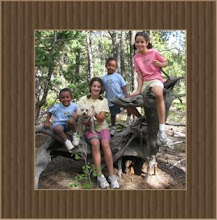It
was the third day in a row, or maybe the fourth. I don’t exactly
recall. I do, however, vividly remember coming home from work and being
met by my normally patient and long-suffering wife declaring in an
overly frustrated tone “Here, you deal with him. I’m done!”
The kids were home for Christmas break and one son in particular was
being more than a handful. This was very uncharacteristic for him. The
first day we thought it was simply childhood Christmas excitement. By
the second day, we were beginning to lose our patience. When I arrived
home this day my wife was almost at her wits’ end. Nagging, whining,
crying, bugging siblings, arguing, you name it. But why? Didn’t he
know Christmas was almost here? Had he forgotten that Santa was “making
his list and checking it twice?” Wasn’t he aware of how much mom and
dad had to do in order to get ready for Christmas? For so many reasons,
now was not the time for him to be acting this way.
What I did next doesn’t come
naturally to me. Try as I might to ‘practice what I preach,’ I admit
that my default reaction to situations like this is to ‘lay down the
law.’ But something told me there was much, much more going on than
simply bad behavior. Call it what you will, I like to think of it as my
God-given “adoptive dad instinct.” So I said to my son, “Let’s go for a
walk.” And after a little cajoling, he agreed and so off we went.
We walked for a while engaged in nothing but small talk. Eventually I changed the subject. “So what’s going on?” I asked.
“Nothing,” he answered.
“Of course,” I thought sarcastically to myself. But I persisted.
“Mom says you’ve really been acting up the last few days,” I
continued. He nodded in agreement. “That’s not really like you. Is
something wrong? Are you worried about something? Maybe upset about
something?”
This time he shrugged his shoulders and just kinda hung his head and
shook it side to side, ever so slightly. I’d seen that look before. It
told me I was on the right track. And then he gave it away.
“Do I have to tell you?” he asked. This is the tell-tale question he
always asks when he has something he really needs to talk about, but is
a little afraid to bring it up. More often than not the subject is
adoption-related. So I gave him the response I always give when he asks
me this question. “Of course you don’t have to, but you know I always
want to hear what you are thinking – no matter what it is.”
And then he practically blurted it out. “Dad, Christmas just
stinks!” he exclaimed. “I know I am supposed to love it and be having
fun, but I just hate it. I really do.”
It instantly occurred to me that somehow I managed to have the only
elementary school-aged child in all of America who actually hates
Christmas. But I quickly asked the obvious question, “Why?”
“Because it makes me really sad,” he said. “It makes me think about
my birthmom and my birth family. I wonder what they are doing. Do you
think they think about me?”
“I bet they do,” I replied. “No…I am sure they do. And did you know
something else? You’re not the only kid that thinks Christmas stinks
because of that very same reason.”
“I’m not?” he said, finally slowing down to look directly at me.
I grabbed his hand and we continued. “No. You know Ms. Melanie who was adopted when she was a little girl?” I asked.
“Yeh,” he replied.
“She’s told me a million times that lots of special occasions, like
Christmas, birthdays, even Mother’s Day and Father’s Day, are really
hard for her. She even has a special name for those times that make her
kinda sad and make her think of her birth parents and her birth
family. She calls them ‘trigger moments.’ This happens a lot for
people who were adopted, and not just when they are kids. She says that
even though she is an adult, it still happens for her sometimes,” I
explained.
I’ve always heard the expression “the weight of the world being
lifted off of your shoulders,” but I don’t think I’d ever literally seen
it happen until this moment. It was though he realized in an instant
that everything he had been feeling and thinking was not only “ok,” it
was also very real and quite normal. And the fact that I was
understanding, even if it could not fully understand – that was all he
seemed to need.
Our walk lasted over an hour as we continued talking about what he
had been feeling and processing over the past several days. We talked
about how it was “ok” to feel these things, but it wasn’t “ok” to act
the way he had been acting. Instead, he needed to find a way to talk
with mom or me about it. As important, I assured him we would do a
better job of being available for him, especially during times like
these.
I can’t honestly say that I truly understand all that he must have
been feeling or thinking in his little heart and mind. And frankly, the
connection between all of that and his behavior still somewhat alludes
me. But I know that his feelings are very real.
Amidst all of the tinsel and lights and despite the excitement of
being out of school and the anticipation of the gifts and fun of
Christmas day, the reality is that my kids – not unlike other kids who
were adopted – still have profound losses that cannot be erased and must
not be ignored. And sometimes, even against their own wishes, their
past and what they have lost comes crashing in. Even at happy times
like Christmas.
In the face of all this, my job – whether at Christmas, on birthdays,
on Father’s Day or whenever – is to always be available for my kids.
To be open and willing to listen and talk, and allow all of who they are
to become part of our holidays and special occasions. As we do this, I
realize more and more that rather than taking away from these happy
times, embracing them and all of their past allows them to be more fully
present – and allows us, as a family, to be more connected as we move
forward.
After learning from my son why Christmas stinks sometimes, I no
longer look at Christmas quite the same as I once did. But of course I
wouldn’t have it any other way.
Click here for a PDF of this article published in the December 2011 issue of
Adoption Today.
For further reading on this subject (sometimes referred to as “traumaversaries”), read this article —
Traumaversaries: Lessening the Impact of Adopted Children’s Annual Triggers.

















































